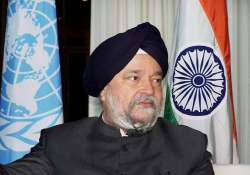India suggests winding up UN observers in Kashmir
United Nations, Jan 22: India has suggested winding up the United Nations Military Observer Group in India and Pakistan (UNMOGIP), saying its "role has been overtaken by the Simla Agreement of 1972 between India and

United Nations, Jan 22: India has suggested winding up the United Nations Military Observer Group in India and Pakistan (UNMOGIP), saying its "role has been overtaken by the Simla Agreement of 1972 between India and Pakistan".
"In times of austerity, we need to address the question whether the resources being spent on UNMOGIP would not be better utilised elsewhere," India's Permanent Representative to UN Hardeep Singh Puri said during a Security Council debate Monday on UN peacekeeping.
"India is proud to have been associated with UN peacekeeping from its very inception," he said, noting New Delhi has contributed more than 100,000 peacekeepers to virtually every UN peacekeeping operation in the past six decades.
"Unfortunately, resource allocation has failed to keep pace with the mandate expansion, and peacekeeping missions are called upon to do more and more with less and less," he said.
"Resources accorded need to be commensurate with the mandates and efficiency measures should not compromise operational necessities."
Later joining issue with Puri, Pakistan's representative suggested "No bilateral agreement between India and Pakistan has overtaken or affected the role or legality of UNMOGIP" and it continues to monitor the ceasefire in accordance with Security Council resolution.
In response, India's Counsellor Manish Gupta pointed out that "UNMOGIP's role was to supervise the cease-fire line which was established in Jammu and Kashmir as a result of the Karachi Agreement of 1949".
That cease-fire line no longer exists and a new cease-fire line came into existence on 17 Dec, 1971 after the India-Pakistan war, he said.
Following the Simla Agreement of 1972 between India and Pakistan, the two countries resolved to respect the Line of Control resulting from the Dec 17, 1971 ceasefire and settle their differences by peaceful means through bilateral negotiations, Gupta said.
"Subsequently, the Line of Control was delineated in Jammu and Kashmir in pursuance to that agreement with approval of both the governments," he said. "Thus, UNMOGIP's role has been overtaken by these developments."
"In times of austerity, we need to address the question whether the resources being spent on UNMOGIP would not be better utilised elsewhere," India's Permanent Representative to UN Hardeep Singh Puri said during a Security Council debate Monday on UN peacekeeping.
"India is proud to have been associated with UN peacekeeping from its very inception," he said, noting New Delhi has contributed more than 100,000 peacekeepers to virtually every UN peacekeeping operation in the past six decades.
"Unfortunately, resource allocation has failed to keep pace with the mandate expansion, and peacekeeping missions are called upon to do more and more with less and less," he said.
"Resources accorded need to be commensurate with the mandates and efficiency measures should not compromise operational necessities."
Later joining issue with Puri, Pakistan's representative suggested "No bilateral agreement between India and Pakistan has overtaken or affected the role or legality of UNMOGIP" and it continues to monitor the ceasefire in accordance with Security Council resolution.
In response, India's Counsellor Manish Gupta pointed out that "UNMOGIP's role was to supervise the cease-fire line which was established in Jammu and Kashmir as a result of the Karachi Agreement of 1949".
That cease-fire line no longer exists and a new cease-fire line came into existence on 17 Dec, 1971 after the India-Pakistan war, he said.
Following the Simla Agreement of 1972 between India and Pakistan, the two countries resolved to respect the Line of Control resulting from the Dec 17, 1971 ceasefire and settle their differences by peaceful means through bilateral negotiations, Gupta said.
"Subsequently, the Line of Control was delineated in Jammu and Kashmir in pursuance to that agreement with approval of both the governments," he said. "Thus, UNMOGIP's role has been overtaken by these developments."